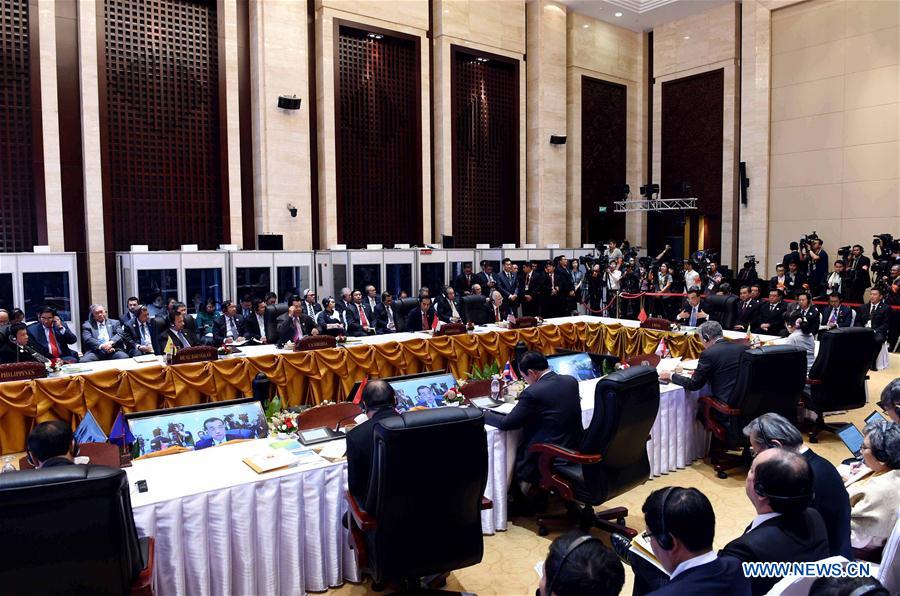
Chinese Premier Li Keqiang attends the 19th summit between China and the Association of Southeast Asian Nations (ASEAN) to commemorate the 25th Anniversary of China-ASEAN Dialogue Relations, in Vientiane, Laos, Sept. 7, 2016. (Xinhua/Rao Aimin)
by Lin Hao, Zhang Ning
VIENTIANE, Sept. 8 (Xinhua) -- As leaders from the the Association of the Southeast Asian Nations (ASEAN) member states gather in the Lao capital of Vientiane for a summit this week, regional cooperation and development is high on their agenda.
Facing with the anemic economic landscape and growing anti-globalization sentiment in parts of the world, analysts in Southeast Asia stress the importance of closer regional integration for the growth prospect, and expect China to play a positive and significant role.
COMMON CHALLENGES
In his keynote address, Lao President Bounnhang Vorachith, whose country holds the ASEAN chairmanship this year, identified the challenges faced by the region.
"Regional and international environments have undergone rapid and complex challenges," he told leaders of his fellow ASEAN countries. "Although the global economy has gradually recovered, growth remains slow and fragile."
He urged ASEAN to enhance cooperation and collaboration with its dialogue partners and the larger international community "in order to be able to respond to and address the said challenges in a timely manner."
The weak global economic growth was aggregated by an emerging anti-globalization sentiment, notably in the Western countries, said Wang Jiangyu, associate professor at National University of Singapore.
The trend was caused by the imbalance in distribution as well as the lack of solution to the internal income gap and the failure to compensate those lose out in globalization in major economies, Wang told Xinhua.
It may lead to capital and industries reflow to the advanced economies, draining the benefit of globalization from Asia, he said.
"The best solution is to return to the prospect of Asian integration," he said. "Asian countries may come to realize the necessity to speed up the integration and to build a common market."
Those countries which have pin their hope on the U.S. -led Trans-Pacific Partnership (TPP) are caught in a quandary as the trade pact may be blocked or shelved due to the rising populism and anti-globalization sentiment in the United State, Wang added.
Wang said China could uphold the regional economic integration by playing a leading role in free trade negotiation, including the Regional Comprehensive Economic Partnership (RCEP), and to build a common Asian market by reducing trade barriers and facilitating free movement of goods, services, capitals and people.
"This will be something that could benefit the future," he said.
Oh Ei Sun, a senior fellow with S. Rajaratnam School of Singapore Nanyang Technological University, said ASEAN countries hope the momentum of China's economic growth would boost regional development, therefore create the great opportunities for China-ASEAN cooperation.
SOLID COOPERATION FOUNDATION
The faith in China on its role to lead regional integration is built on the success of 25 years of China-ASEAN dialogue relations. ASEAN and China held a commemorative summit on Wednesday to mark the achievement since the establishment of dialogue relations.
"On the 25th anniversary of ASEAN-China dialogue relations, personally I think there are a lot of reasons to celebrate because this cooperation has been very successful in many ways," said Abdul Majid Ahmad Khan, Former Malaysian ambassador to China.
"First, the cooperation has benefited not only ASEAN and China, but also the region. With China's engagement with ASEAN, we have seen more peaceful, stabilized Southeast Asia," he told Xinhua.
"Secondly, China's contribution has been surprising in terms of the programs, in terms of the activities and also in terms of the mechanisms that has been established."
Insofar as concrete results, great achievements have been made in terms of trade, investment and other area, he said.
China and ASEAN are now indispensable to each other economically, thanks to the steady growth of trade and investment in the past 25 years. China has been ASEAN's largest trading partner for seventh consecutive years, and ASEAN has been China's third largest trading partner for 5 years.
"ASEAN and China have come a long way in building and strengthening their strategic relationship," said Teh Cheng Guan at University of Science, Malaysia.
"As China grew and developed economically, economic ties between ASEAN member states and China have become stronger. This creates economic interdependence and encourages further cooperation, not only at the ASEAN-wide level but also at sub-regional levels such as the Greater Mekong Sub-region (GMS)," he said.
GREATER REGIONAL INTEGRATION
For ASEAN, analyst expects China to support its further community building and cement its ties with the 10-member bloc, as both sides joint hand to foster greater regional integration.
"The past 25 years have proved China's significance and its role to the development of ASEAN," said Soukthavy Keola, a former counselor at the Lao embassy in China, adding that the solid foundation built in the 25 years will contribute to future ASEAN-China ties.
ASEAN announced the establishment of ASEAN community in 2015, a milestone of its regional integration effort. Still, it faces the challenge to further reduce non-tariff barrier and the development gap among its members.
Abdul Majid, the former Malaysian ambassador to China, said China could help narrow the development gap by investing and improving infrastructure in the less developed ASEAN members.
China and ASEAN have moved beyond the burgeoning trade relations in recent years to broader economic relations, including investment and industrial capacity cooperation.
For his part, Oh urged China and ASEAN countries to truly move to an economic community with common production base and common market.
"This will not only necessarily bring China and ASEAN toward a true community of common destiny, but could also serve as shining example to other regional major economies," he said.




